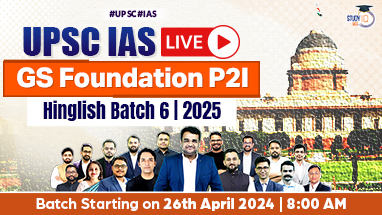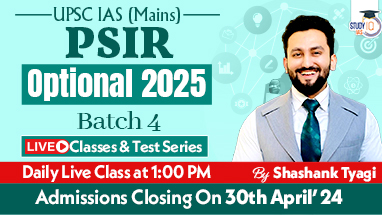The Hindu Newspaper Analysis for UPSC

The Hindu Newspaper Analysis 10 February 2023
- India’s industrial output growth moderated to 4.3% in December 2022 from 7.3% in November, despite mining and electricity production rising at around 10% for the second successive month as manufacturing growth faltered from 6.1% in November to 2.6%.
- While base effects perked up electricity and mining, which had grown at 2.8% and 2.6% respectively, a year earlier, manufacturing didn’t see such a push despite a mere 0.6% rise in December 2021.
- Yet, overall manufacturing levels were 4.7% higher on a sequential basis and the Manufacturing index component of the Index of Industrial Production (IIP) hitting the highest level since March 2022.
What is the Index of Industrial Production?
- IIP is an indicator that measures the changes in the volume of production of industrial products during a given period.
- It is compiled and published monthly by the National Statistical Office (NSO), Ministry of Statistics and Programme Implementation.
- It is a composite indicator that measures the growth rate of industry groups classified under:
- Broad sectors, namely, Mining, Manufacturing, and Electricity.
- Use-based sectors, namely Basic Goods, Capital Goods, and Intermediate Goods.
- Base Year for IIP is 2011-2012.

- Today’s security threats have an all-embracing character and there is a crying need for in-depth discussions on futuristic themes in policing, such as cyber crime, the dark web, crypto, maritime security, the threat from drones, and also problems stemming from an unchecked social media. These are in addition to subjects such as left-wing extremism, counter-terrorism, drug trafficking and border issues.
- Law and order management today would be a good starting point in this context. This subject may appear rather mundane in a world dominated by technology; but what it currently demands is a combination of newer skills, in both technology and crowd management, which are not readily available among security agencies.
- The attention of most security forces in the country has essentially been devoted to ongoing threats such as terrorism, which has resulted in law and order management being put on the back burner.
- Police and security agencies, must consequently, be provided with the right attributes, and for which they need to be adequately trained.
- The selection of personnel to security agencies, especially the police, also will require a total makeover. The 21st century is proving to be vastly different from the 20th century, and the choice of personnel to man security agencies requires more high-level attention than has been devoted to this task.
- In short order, it can be said that there is a case for splitting the annual conference of DGPs/IGPs into two separate conferences — a higher level conference of DGPs/IGPs to discuss policy related issues, and a separate conference to be held of intelligence and security specialists (IGs/CID) to discuss the finer points of methodology, techniques and acquisition of new skills for current and future problems.
- Outcomes would then become more relevant to current and future security needs.

- More than 2,000 people have been arrested in a statewide crackdown on child marriages that have taken place in the state of Assam.
- UN estimates suggest that 1.5 million girls get married before they turn 18 in India.
- According to the 2011 census, 44 per cent of women in Assam were married before the age of 18. The figures for Rajasthan, Bihar, and Madhya Pradesh were 47 per cent, 46 per cent, and 43 per cent, respectively.

Laws present to prevent Child Marriage:
- The POCSO Act, of 2012 criminalizes sex between a minor and an adult. The law does not recognize a minor’s consent as valid. Sexual assault under POCSO is a non-bailable, cognizable offence.
- Section 19 of, the POCSO Act imposes a “mandatory reporting obligation” which requires every person who suspects or has knowledge of a sexual offence being committed against a child must report it to the police or the Special Juvenile Police Unit.
- The Prohibition of Child Marriage Act 2006, says that child marriages are illegal but not void. Instead, they are voidable at the option of the minor party, in the scenario that the minor petitions the court to declare the marriage void. The Act stipulates 18 years as the minimum marriageable age for women, while for men it is 21 years.
- The punishment also extends to anyone who performs, conducts, directs, or abets any child marriage.

- The Animal Welfare Board of India (AWBI) has withdrawn on Friday its February 6 appeal urging people to celebrate February 14 as ‘Cow Hug Day’. The appeal invited criticism from farmers’ organisations and trade unions that such a circular was against the promotion of scientific temper.
- In social media too, the appeal, issued by Secretary of the Animal Welfare Board of India S.K. Dutta, was criticised for suggesting to hug cows on Valentine’s Day.
- Dutta said in a fresh circular issued on Friday that the decision to withdraw the appeal is after directions from the Ministry of Fisheries, Animal Husbandry and Dairying.
- AWBI is a statutory advisory body under the Union Ministry of Fisheries, Animal Husbandry and Dairying (Department of Animal Husbandry and Dairying)
- It derives its legal structure from the Prevention of Cruelty to Animals Act, 1960.
- It was established in 1962
- It was started under the stewardship of Late Smt. Rukmini Devi Arundale, well known humanitarian.
Membership:
- Several government organisations, along with animal rights activists and parliamentarians, are represented on the Board.
- The Board consists of 28 Members.
- The term of office of Members is for a period of 3 years.

- A five-judge Constitution Bench of the Supreme Court on Friday (February 10) referred the challenge to the constitutional validity of the practice of excommunication in the Dawoodi Bohra community to the nine-judge Bench constituted to review the September 28, 2018 Sabarimala judgment.
- The Dawoodi Bohras are Shia Muslims whose leader is known as the Al-Dai-Al-Mutlaq. According to members of the community, there are around 1 million Dawoodi Bohras spread around the world.
- For over 400 years, the leader of the community has been based in India, including the current and the 53rd leader, His Holiness Dr Syedna Mufaddal Saifuddin.
- The leader of the community is recognised by the members as having the right to excommunicate its members. In practical terms, excommunication means not being allowed to access a mosque belonging to the community or a burial dedicated to the community.
- On November 1, 1949, the Bombay Prevention of Excommunication Act (now repealed) was enacted, which sought to prevent the practice of excommunication prevalent in certain communities, as it led to the deprivation of legitimate rights and privileges of its members and in “keeping with the spirit of changing times and in public interest”.
- The 51st leader of the community, Sardar Syedna Taher Saifuddin Saheb, challenged the constitutional validity of the Act, stating it violated fundamental rights guaranteed by the Constitution under Articles 25 (Freedom of conscience and free profession, practice and propagation of religion) and 26 (Freedom to manage religious affairs).
- It was submitted that the power of excommunication was part of the management of community affairs in matters of religion, and depriving the Dai (leader) of the right and making its exercise a penal offence “struck at the very life of the denomination and rendered it impotent to protect itself against dissidents and schismatics”.
- A Constitution Bench of the SC held in 1962 that the Dai’s position is an essential part of the community and the power to excommunicate is to enforce discipline and preserve the denomination, not to punish. (Sardar Syedna Saifuddin v. State of Bombay)
- A challenge to the 1962 judgment was filed in 1986. While that petition was still pending, the Maharashtra Protection of People from Social Boycott (Prevention, Prohibition and Redressal) Act, 2016, was passed.
- The 2016 Act prohibits the social boycott of a person or a group of persons, and terms it a violation of fundamental rights. The Act describes a social boycott as “inhuman”, and defines 16 types of social boycott — including preventing members of a community from having access to facilities including community halls, burial grounds, etc.
- In October 2022, the court said that it would consider whether the practice of excommunication that was protected by the 1962 order can continue.

- The discovery of 5.9 tonnes of lithium deposits in Jammu and Kashmir, a first for India, would reduce the need for imports and improve employment opportunities, officials in the Union Territory said on Friday, adding that the find was a major boost to the manufacture of rechargeable batteries for smartphones, laptops and electric cars.
- The lithium inferred resources have been established in Reasi district. “There was a presence of bauxite in composite form and during its processing lithium was also discovered. We had explored it earlier also but now this time it has been approved by the Geological Survey of India (GSI),” said Shafiq Ahmad, District Mineral Officer, Reasi. The mineral blocks are likely to be auctioned after sanction from the Central government.
Benefits of Domestic Exploration:
- Reducing Import Bill:
- India currently imports all its lithium needs. Over 165 crore lithium batteries are estimated to have been imported into India between 2016-17 and 2019-20, at an estimated import bill of upwards of USD 3.3 billion.
- Reducing Overdependence on China:
- China is a major source of lithium-ion energy storage products being imported into the country.
Q) The Lieutenant Governor of Delhi has executive control over the reserved subjects which include
- Police
- Education
- Land
- Excise
- Agriculture
Select the correct answer code:
- 1, 2, 3
- 1, 3
- 1, 3, 4, 5
- 2, 4, 5
दिल्ली के लेफ्टिनेंट गवर्नर का आरक्षित विषयों पर कार्यकारी नियंत्रण होता है जिसमें शामिल हैं
- पुलिस
- शिक्षा
- भूमि
- आबकारी
- कृषि
सही उत्तर कूट का चयन करें:
- 1, 2, 3
- 1, 3
- 1, 3, 4, 5
- 2, 4, 5
- Technically, the Lieutenant Governor has executive control over only the three reserved subjects of police, public order and land; all other subjects (transferred subjects) lie with the elected government.
Q) Consider the following statements.
- The Constitution of India declares that Indians possess freedom of speech, but is subject to the interest of public order, or the sovereignty and integrity of India.
- In India fundamental rights cannot be enforced against persons other than the state and its instrumentalities.
Which of the above statements is/are correct?
- 1 only
- 2 only
- Both 1 and 2
- Neither 1 nor 2
निम्नलिखित कथनों पर विचार करें।
- भारत का संविधान घोषित करता है कि भारतीयों को बोलने की स्वतंत्रता है, लेकिन यह सार्वजनिक व्यवस्था, या भारत की संप्रभुता और अखंडता के हित के अधीन है।
- भारत में मौलिक अधिकारों को राज्य और उसके साधनों के अलावा अन्य व्यक्तियों के खिलाफ लागू नहीं किया जा सकता है।
उपरोक्त कथनों में से कौन-सा/से सही है/हैं?
- केवल 1
- केवल 2
- 1 और 2 दोनों
- न तो 1 और न ही 2
- The freedom of speech is one of the most cherished freedoms. The Constitution of India, too, declares that Indians possess this freedom, but makes it subject to the interest of public order, or the sovereignty and integrity of India.
- The right to freedom of expression has been recognised as a human right in the Universal Declaration of Human Rights and international human rights law by the United Nations.
- The Court concluded that such fundamental rights can be enforced even against persons other than the state and its instrumentalities.
Q) Consider the following statements:
- Part XI-A of the Indian constitution deals with municipalities.
- Urban governance is part of the state list under the Constitution.
Which of the above statements is/are Incorrect?
- 1 only
- 2 only
- Both 1 and 2
- Neither 1 nor 2
निम्नलिखित कथनों पर विचार करें:
- भारतीय संविधान का भाग XI-A नगर पालिकाओं से संबंधित है।
- शहरी शासन संविधान के तहत राज्य सूची का हिस्सा है।
उपरोक्त में से कौन सा/से कथन गलत है/हैं?
- केवल 1
- केवल 2
- 1 और 2 दोनों
- न तो 1 और न ही 2
Explanation:
- The Constitution (74th Amendment) Act, 1992 has introduced (Part IX A Article 243 P to ZG] and Schedule XII) in the Constitution, which provides for the establishment of urban local bodies (ULBs) as institutions of local self-government.
- It has empowered state governments to devolve the responsibility of 18 functions including urban planning, regulation of land use, water supply, etc., and made periodic elections compulsory for them.
- Urban governance is part of the state list under the Constitution. Thus, the administrative framework and regulation of ULBs vary across states.
- Experts have highlighted that ULBs across India face similar challenges. For instance, lacking autonomy, city-level functions are managed by parastatals, devolution of powers is incomplete (lacks taxation powers – stressed municipal finances), irregular elections, etc.
Q) Turkey shares border with
- Bulgaria
- Greece
- Armenia
- Azerbaijan
- Iraq
Select the correct answer using the code below:
- 1, 2, 3 and 4 only
- 1, 3 and 4 only
- 2 and 5 only
- 1, 2, 3, 4 and 5
तुर्की के साथ सीमा साझा करता है
- बुल्गारिया
- ग्रीस
- आर्मेनिया
- अजरबैजान
- इराक
नीचे दिए गए कूट का प्रयोग कर सही उत्तर चुनिए:
- केवल 1, 2, 3 और 4
- केवल 1, 3 और 4
- केवल 2 और 5
- 1, 2, 3, 4 और 5
Explanation:
- Turkey’s neighbor to the northwest is Bulgaria; Greece to the west; Armenia, Azerbaijan and Iran to the east; Georgia to the northeast; Syria to the south; and Iraq to the southeast.

Mains Practice Question:
Q) ‘Communalism arises either due to power struggle or relative deprivation’. Argue by giving suitable illustrations. (2018)
‘सांप्रदायिकता या तो सत्ता संघर्ष या सापेक्ष अभाव के कारण उत्पन्न होती है’। उपयुक्त उदाहरण देते हुए तर्क दीजिए। (2018)

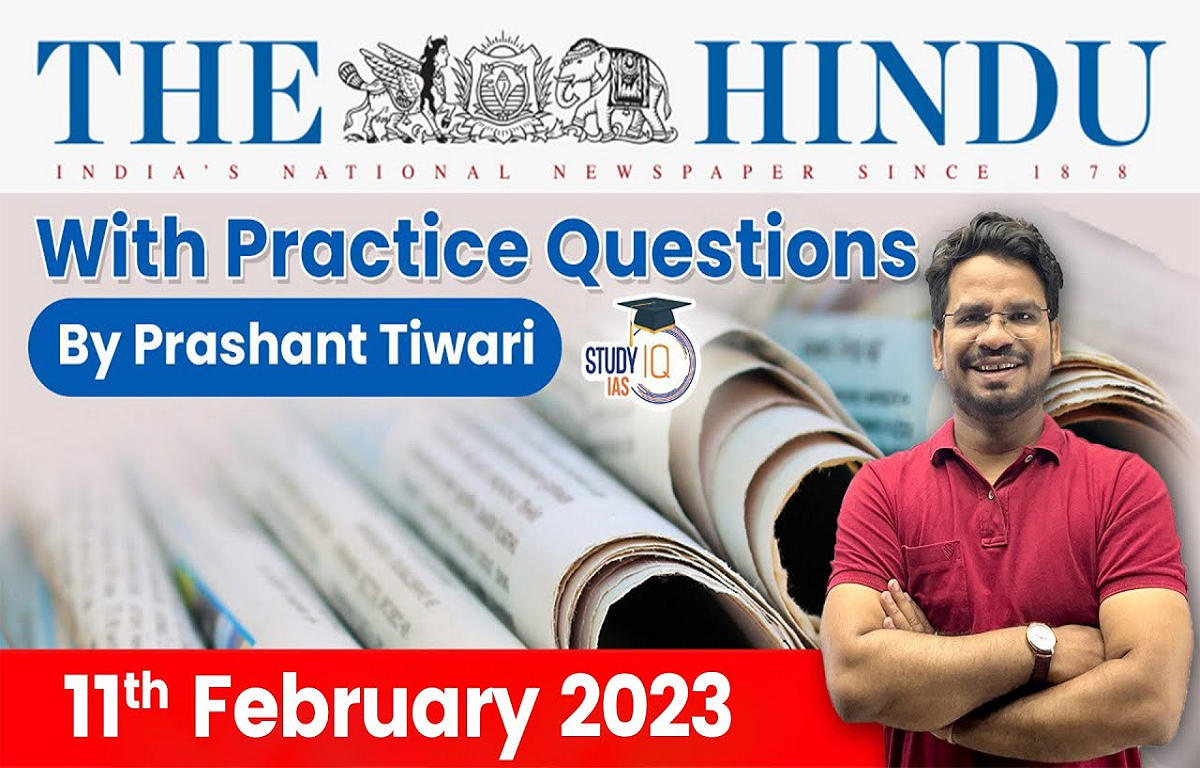
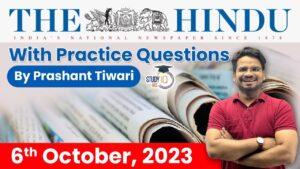 The Hindu Newspaper Analysis 6 October 2...
The Hindu Newspaper Analysis 6 October 2...
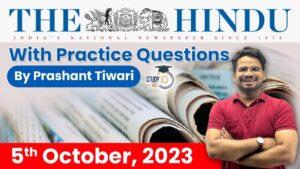 The Hindu Newspaper Analysis 5 October 2...
The Hindu Newspaper Analysis 5 October 2...
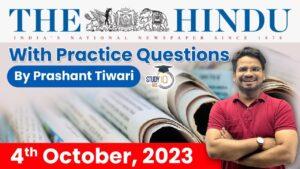 The Hindu Newspaper Analysis 4 October 2...
The Hindu Newspaper Analysis 4 October 2...
